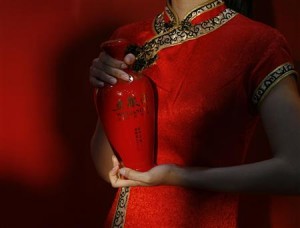 Since the middle of 2012, the government has implemented a number of anti-luxury policies to limit the amount of official spending on extravagant items such as “baiju” liquor. Though sales and bottom lines have increased in the last few years, numbers are expected to decline as the government’s ban takes effect. The ban has largely affected sales prices as companies such as Kweichow Moutai, one of the most prestigious brands, experienced lower retail prices, extravagant fines from the government, and decreased volume sales. Some of the mid-range brands are more likely to be able to escape official scrutiny. And many of the larger brands are expected to begin buying up regional brands, producing smaller bottles and cheaper brands to sustain business.
Since the middle of 2012, the government has implemented a number of anti-luxury policies to limit the amount of official spending on extravagant items such as “baiju” liquor. Though sales and bottom lines have increased in the last few years, numbers are expected to decline as the government’s ban takes effect. The ban has largely affected sales prices as companies such as Kweichow Moutai, one of the most prestigious brands, experienced lower retail prices, extravagant fines from the government, and decreased volume sales. Some of the mid-range brands are more likely to be able to escape official scrutiny. And many of the larger brands are expected to begin buying up regional brands, producing smaller bottles and cheaper brands to sustain business.
Though the industry is likely to continue to decline as a result of the new regulations, like we have seen with the car industry throughout the course, companies and consumers will probably find ways to work around the ban. In fact, it has been reported that many officials are going underground to purchase the prestigious alcohol.
Drinking and the gifting of alcohol has always been a large part of the business and political culture in China as signs of respect and camaraderie. What does this new ban reflect about the shifting culture of the government and will it have any effect on the way business is conducted? Will the ban hold given China’s history of working around government policies?
Source: Reuters
The beer industry is interesting, lots of consolidation, SABMiller is the powerhouse (AB InBev does less well). So surely similar consolidation (combined with improved management) is taking place in other consumer goods, such as liquor. Stronger branding, streamlined distribution, wider product offerings … that’s happened in other markets already. So why not China?
I should add that sumptuary regulations have a long history, and are applied in particular to conspicuous consumption – clothing, drink, housing, servants – both with the idea of reining in consumption (fat chance! – there’s a long history as well of fashions shifting to goods that are less conspicuous in the ruler’s eyes) and of showing a public face of restraint. I don’t know the history in China, but have to assume that those in Japan drew upon political philosophy from the mainland.
So for baiju, shift to less flashy containers … or to non-regulated types of booze (single-malt scotch, anyone? a good bordeaux?) … or non-regulated types of gifts. My sense of something such as baiju, however, is that you give it in front of others, so it’s important that (i) it be small and (ii) its value be recognized.
We of course read extensively about the non-elite version of this, giving cigarettes and the etiquette thereof.
It’s really interesting that this is the topic that the central government deems the most pertinent. Was the amount being spent really that high? Especially considering all of the illegal activity that is going on it strikes me as odd that the central figures in Beijing would decide this is where the line needs to be drawn.
With bootlegging an issue in the United States during periods of higher alcohol regulation, is this a current issue in China? It would be interesting to look at the effects of regulation regarding black market size. Also, examining on-premise to off premise alcohol purchases would indicate alcohol consumption patterns of China across different regions.
Isn’t the central government trying to focus the economy on urban consumption by its residents? Banning the purchase of luxury items seems to me to be the opposite of what they are trying to do. I’m not sure how this policy would even help their cause.